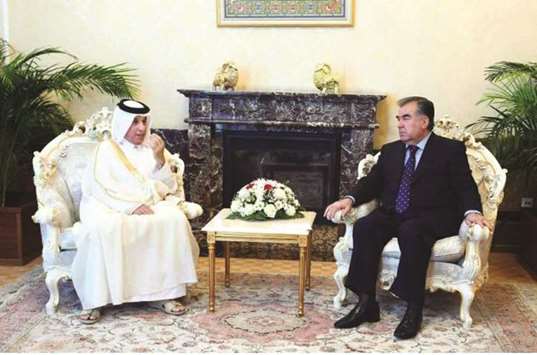HE the Minister of State for Foreign Affairs Sultan bin Saad al-Muraikhi stressed that the fight against terrorism and extremism is a top priority for Qatar’s foreign policy and is at the core of its approaches and interests. What affirms this is the commitment and effective contribution of Qatar to regional and international efforts and measures related to combating terrorism and its financing, he said.
In his speech before the second session of the Arab Co-operation and Economic Forum with Central Asian states and the Republic of Azerbaijan, being held in Tajikistan, al-Muraikhi, while reaffirming the position of Qatar which renounces and condemns all forms of violence and terrorism regardless of its causes and motives, said Qatar rejects double standards in dealing with this phenomenon or linking it to a particular religion, race or civilisation.
Terrorism and extremism are one of the most serious challenges for the world and concerted efforts are required to confront terrorist organisations and their extremist ideology to preserve the security and stability of the world, the minister said.
He added that Israel continues to stand in the way of achieving a lasting, just and comprehensive peace and continues its intransigent approach and is working to change the situation on the ground by expanding settlements, ‘Judaizing Jerusalem’ and restricting the performance of religious rites in Al Aqsa Mosque and continuing its unjust blockade of Gaza strip.
While affirming strongly that any effort to achieve security and stability in the region is linked to reaching a just and comprehensive settlement based on the Arab peace initiative and resolutions of international legitimacy and the establishment of an independent Palestinian state with Jerusalem as its capital, Qatar appreciates the positions of Central Asian states and the Republic of Azerbaijan in support of Palestinian people’s right to self-determination and the establishment of an independent state on the June 1967 borders with Jerusalem as its capital in accordance with the internationally agreed two-state solution, the minister said.
On Syria, al-Muraikhi said that the international community is still unable to fulfil its legal and moral responsibilities in finding a solution to the Syrian crisis despite its consequences and grave repercussions on the region and the world, pointing out that the political efforts are still faltering with the dominance of the logic of might and impunity and lack of holding war criminals accountable.
The minister stressed that the international community must work hard to reach a political solution that will meet the aspiration of brotherly Syrian people for justice, dignity and freedom, stressing that ending the tragedy of the brotherly Syrian people depends on taking measures and decisions binding upon the Syrian regime to implement Geneva declaration (1), which provides for the formation of a full-fledged transitional governing body.
As for Iraq, al-Muraikhi said that Qatar supports the efforts of the Iraqi government to ensure security, stability and unity of Iraq, commending the achievements made in the fight against terrorism. He stressed Qatar’s support for Iraq in completing these victories by achieving the aspirations of the Iraqi people for equality among its citizens, restoring its Arab and regional role, restoring the unity of its people and reconstructing its affected areas.
He pointed out that the Arab relations with the countries of Central Asia and the Republic of Azerbaijan, which have shared geographical, cultural and civilisational aspects with the Arab world as well as common history and heritage supported by a genuine desire to strengthen co-operation between them along with enjoying strategic location and diversified natural resources, are built on a solid foundation of strategic economic co-operation to maximise the use of enormous potential and expand economic co-operation, trade and investment between them.
“Despite the fact that economic co-operation between the two sides is witnessing remarkable progress in terms of increasing trade and investment, we are looking for more partnerships and strategic economic relations, which will deepen the common interests of the peoples of the two regions,” he said.
“I would like to take this opportunity to note with satisfaction the progress made in bilateral relations between Qatar and the Central Asian countries and the Republic of Azerbaijan in many fields, thanks to the sincere will and common desire to enhance co-operation in all fields.”
The minister referred to mutual visits in recent years at the highest levels between the two sides and the positive momentum that contributed to signing several co-operation agreements between the two sides in the economic, commercial and investment, sports, cultural and legal fields, along with in air transport, education, higher education, scientific research domains and in combating crime and other fields.
He added that the second session of the forum will open up new opportunities for strengthening the mechanisms of consultation, co-operation and strategic partnership, adding that the Dushanbe declaration, which will be issued by the forum, will give the two sides greater ability to face current and future problems, thus achieving constructive participation in enhancing regional and international stability based on the Charter of the United Nations and the principles of international law.

Tajikistan President Emomali Rahmon meets with HE the Minister of State for Foreign Affairs Sultan bin Saad al-Muraikhi on the sidelines of second session of the Arab Co-operation and Economic Forum with Central Asian states and the Republic of Azerbaijan, being held in Tajikistan.
